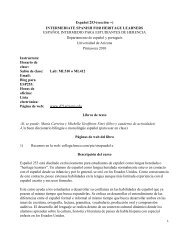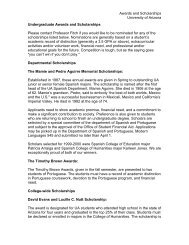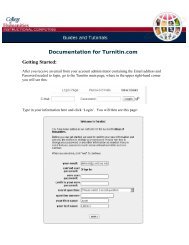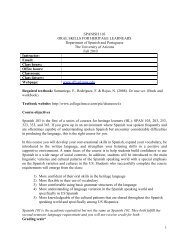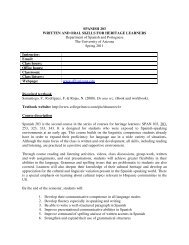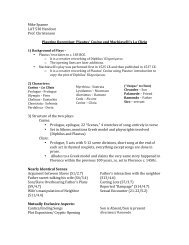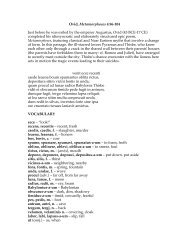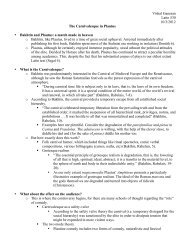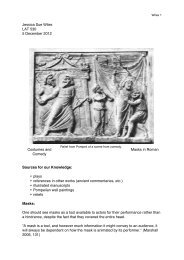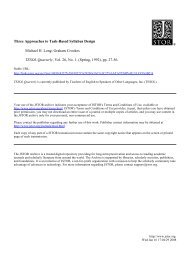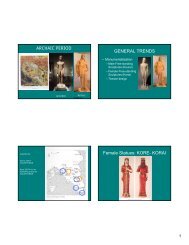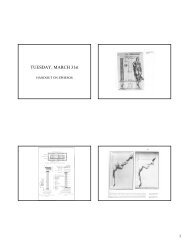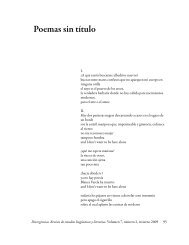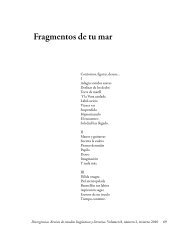SPANISH 203 WRITTEN AND ORAL SKILLS FOR HERITAGE ...
SPANISH 203 WRITTEN AND ORAL SKILLS FOR HERITAGE ...
SPANISH 203 WRITTEN AND ORAL SKILLS FOR HERITAGE ...
Create successful ePaper yourself
Turn your PDF publications into a flip-book with our unique Google optimized e-Paper software.
Disruptive behavior<br />
Unless you discuss an emergency situation with your instructor in advance, NO CELL PHONES,<br />
pagers or other electronic communication devices such as laptops or agendas are to be on or used<br />
during class. They are entirely prohibited during exams. Other disrupting behavior such as<br />
reading the newspaper, conversing while somebody is talking, leaving the classroom during<br />
class, etc, will not be allowed.<br />
Code of Academic Integrity<br />
The instructor and the Program Director will initiate an academic integrity case against students<br />
suspected of cheating, plagiarizing, or aiding others in dishonest academic behavior. Students are<br />
responsible for reading and understanding the Code of Academic Integrity, please refer to:<br />
http://studpubs.web.arizona.edu/policies/cacaint.htm. Examples of academic dishonesty include,<br />
but are not limited to, plagiarism, cheating, and aiding and abetting dishonesty. If the instructor<br />
suspects that a Code of Academic Violation has occurred, she/he in accordance with the Program<br />
Director shall impose any one of the following or a combination of the following sanctions: (1)<br />
Loss of credit for work involved, (2) Reduction in grade for the entire course, (3) Failing grade,<br />
(4) Disciplinary probation. For policies against threatening behavior by students, please visit:<br />
http://policy.web.arizona.edu/~policy/threaten.shtml.<br />
Disability<br />
Those students who are registered with the Disability Resource Center must submit appropriate<br />
documentation to the instructor if they are requesting reasonable accommodations. Please refer<br />
to: http://drc.arizona.edu/teach/syllabus-statement.html<br />
The information contained in this course syllabus, except for grades and course policies, may be<br />
subject to change with reasonable advance notice, as deemed appropriate by the instructor. The<br />
syllabus below is an approximate description of the course content; however, modifications to it<br />
depend largely on students’ interests and their background knowledge. You are a valuable<br />
resource to the classroom and it is expected that you will greatly contribute to class activities<br />
through introduction of topics that are relevant for you as a heritage learner and as a member of a<br />
Spanish-speaking community.<br />
Horario tentativo<br />
Fechas Capítulos Temas Gramática Ortografía Actividades<br />
Semana<br />
1<br />
(8-23/8-<br />
27)<br />
- Capítulo:<br />
¿Qué significa<br />
ser hispano?<br />
(Entre<br />
Mundos)<br />
-Repaso: 1)<br />
Presente del<br />
indicativo:<br />
Formas y usos<br />
2) ‘ser’ y<br />
‘estar’<br />
-Introducción a<br />
la clase y los<br />
estudiantes<br />
-Programa del<br />
curso<br />
-Cómo tener<br />
éxito en esta<br />
clase:<br />
Sugerencias<br />
-Nuestros<br />
valores<br />
-Nuestra cultura<br />
Actividad:<br />
-Escrito de diagnóstico<br />
en clase (notas de<br />
clase)<br />
-Entrevista de<br />
diagnóstico oral con el<br />
instructor en horas de<br />
oficina<br />
-Mi biografía<br />
lingüística y cultural



